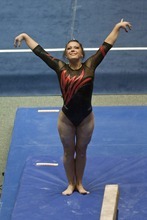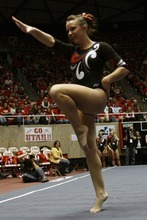This is an archived article that was published on sltrib.com in 2012, and information in the article may be outdated. It is provided only for personal research purposes and may not be reprinted.
Judging at the NCAA Gymnastics Championships often follows a predictable pattern. Frequently the scores are tight in the first few rotations, then they soar higher and higher as the meet continues.
Whether the early low scores are from judges being as nervous as the athletes or the high scores later in the competition are a response to the buildup of a soon-to-be-crowned champion is debatable.
The bigger concern for the Utah Utes isn't why but how their rotation could affect their chances of advancing to the Super Six.
The seventh-seeded Utes will start on the floor and finish on a bye after balance beam Friday in the NCAA Championships.
The Utes, who are competing against No. 2 UCLA, No. 3 Oklahoma, No. 6 Nebraska, No. 10 Stanford and No. 11 LSU in the early session starting at 10 a.m. MDT, must finish in the top three to advance to Saturday's Super Six.
In a close competition such as the NCAAs, whether or not a team advances often comes down to a 10th difference.
The Utes only hope the judges aren't so tight in their scoring the Utes are harmed by starting out on one of their best events. If the Utes don't get the big scores they are accustomed to earning on the floor, it could be hard for them to make up ground in the other events, especially if the scores rise as the meet continues.
Utah ranks sixth in the country averaging a 49.31 on the floor.
"I don't know what to think," Utah co-coach Megan Marsden said of Utah's rotation. "On the one hand, you hope the judges operate out of some knowledge of the teams coming in, but on the other hand, you don't want them to pre-judge teams either. There are a lot of different scenarios that could work against us or could work for us."
The Utes made a concerted effort to recruit gymnasts with more power this year. The result not only has been higher scores on the vault and floor, but increased level of difficulty in the floor routines with freshmen Becky Tutka and Georgia Dabritz competing regularly.
The Utes hope that their difficulty works in their favor and will make it hard for the judges to not give them high scores, as long as they hit.
"Our tumbling is so impressive, we have five with 'E' passes," senior Kyndal Robarts said of the highest rated skills. "Nansy's [Damianova's] passes that aren't E's are gorgeous, so I think our floor will be hard to beat. The way we have to look at it is everyone is going to follow us so the judges can compare them to us."
Opening on the floor worked in the Utes' favor in their NCAA regionals competition as they scored a 49.325 on the event to propel them in the win. The score not only was Utah's highest, but also the highest of any team's on the event.
"The good thing is we get to start on an event that has a lot of adrenalin and that might help us get some of the jitters out," Marsden said. "Especially with a young team, it could help them a lot if they feel like they can cut loose like they did at regionals. "
Tutka started that floor rotation with a 9.775. The former elite gymnast from Pennsylvania believes she can deliver again for the Utes at nationals.
"Greg [Marsden] always says don't worry about the outcome, just go in and do a good routine and be happy with it," she said. "That's what I've done all season and I'll try to do it again." —
NCAA Championships
P Friday-Sunday, Duluth, Ga.
All times MDT
Friday early session (10 a.m.) • 2. UCLA 394.495, 3. Oklahoma 394.385, 6. Nebraska 393.555, 7. Utah 393.53, 10. Stanford 393.085, 11. LSU 392.645.
Friday late session (4 p.m.) • 1. Florida 394.77, 4. Alabama 394.27, 5. Georgia 394.095, 8. Arkansas 393.37, 9. Oregon State 393.21, 12. Ohio State 392.47.
Saturday • Top three teams from each session will advance to the Super Six at 2 p.m.
Sunday • Indiv. finals, 11 a.m. —
Utah's rankings
Floor • 49.31, 6th
Vault • 49.345, 6th
Uneven bars • 49.12, 12th
Balance beam • 49.165, 8th





